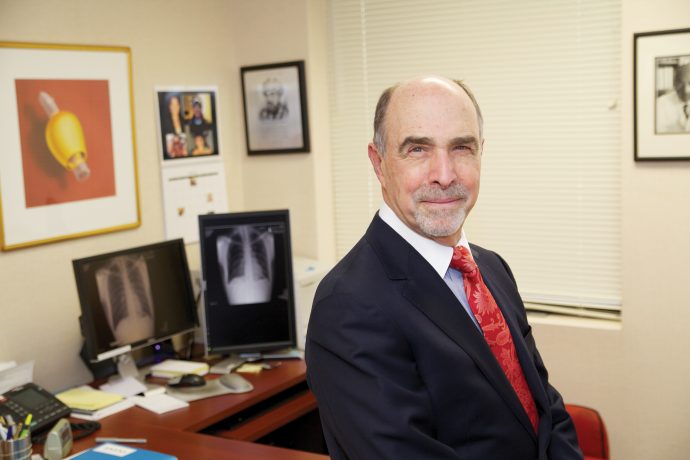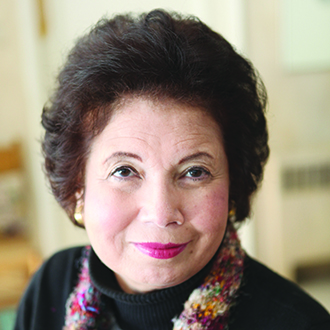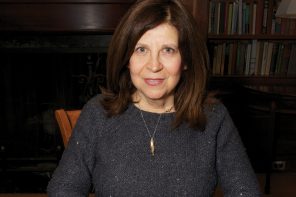“About five years ago I made a personal decision to help empower Phelps Memorial Hospital Center to have a dedicated thoracic surgery department, something that no other hospital in Westchester had,” Dr. Avraham Merav says.
Thoracic surgery involves the repair of organs located in the chest cavity – heart and lungs, esophagus and trachea.
Now head of thoracic surgery at the 238-bed hospital in Sleepy Hollow, Merav has switched disciplines, from concentrating on heart surgery at Montefiore Medical Center in The Bronx to lung surgery at Phelps. He now focuses primarily on treating different forms of lung cancer and has been instrumental in establishing an accredited cancer treatment program at Phelps.
“At Montefiore, I had been treating a lot of patients who came as referrals from Phelps,” he says. “I was finding cardiac surgery increasingly time-consuming and very stressful. After 32 years as a cardiac surgeon, I performed my last open-heart operation in April of 2007. I saw my patients were sicker, older and required lots of recuperation. I wanted to go in a different professional direction.”
Sea change
Around the same time, Merav was approached by staff at Phelps to take a full-time position there, only seven minutes from his home in Pleasantville.
“I was also appointed by the American College of Surgeons Commission on Cancer to spearhead cancer-related activities at Phelps and provide leadership for Phelps’ new cancer program, all steps needed for a cancer program to receive its official accreditation. I welcomed the chance to help Phelps move to another level and become an accredited Community Hospital Cancer Program. The new program received its accreditation last year.
“This ensures that our cancer patients and their families have access to the full scope of services required to diagnose, treat, rehabilitate and support them through the entire process of cancer treatment. I was fortunate to be able to recruit Dr. Rocco Lafaro, a colleague from Montefiore, to join me at Phelps.”
Merav says he’s pleased with his switch from heart surgery to cancer treatment.
“About 70 to 80 percent of the cases we treat at the Phelps cancer center involve lung cancer,” he says. “We have developed a close cooperative relationship with Memorial Sloan Kettering cancer oncologists, and our program is up and running very successfully.
“We had raised the level of patient care at Phelps several notches and in September of 2013 we went even further and launched the Westchester Lung Nodule Center.”
The center has a multidisciplinary medical team to provide patients with early, noninvasive diagnosis and comprehensive treatment.
“Screening for lung cancer at its earliest possible stage makes it easier to cure and we often find that many patients are already in the clear,” Merav says. “Many people are told they have a nodule in the lung and become totally panic-stricken, thinking it must be cancer. But the majority is noncancerous. When we opened the new center, the phones rang of the hook, and it has been very satisfying to bring peace of mind to so many people.”
In the trenches
A native of Israel, Merav earned his medical degree at the University of Basel Medical School in Switzerland. He completed his internship at Mount Sinai Medical Center and a residency in general surgery and a fellowship in cardiothoracic surgery, both at Montefiore, where he was later chief of thoracic surgery. He also served as chief of thoracic surgery at Englewood Hospital and Medical Center in New Jersey for 12 years.
“After finishing medical school in Switzerland, I married my wife, Susan, the daughter of a doctor,” he says. “I enlisted in the Israeli Army and served as a military doctor for three years.
“I was a paratrooper in the Six Day War in l967 and then came to the U.S. for my surgical training. When the Yom Kippur War broke out in l973, I went back to do more medical work in field hospitals. It was an exciting and rewarding time.”
A new day
Merav says looking back on the change he made in his career path gives him a great deal of satisfaction.
“I enjoy working in a smaller, community-based hospital and bringing dramatically improved services to our patients. Every day I feel the appreciation of the medical staff and patients. I also enjoy having the freedom to spend more time with the people I am treating.”
Merav says that profiles of lung cancer patients have changed over the past few decades.
“Now we treat a significant number of patients who have never smoked,” he says. “With so many people now living into their 70s, 80s and 90s, simply getting older has become the second biggest risk factor (for lung cancers) after smoking.”
Merav says he now performs surgery on patients he refers to as “super seniors,” who would not have been candidates years ago.
“Now, if they are selected properly and treated properly, they have a good chance for an excellent outcome. It’s a new day and I am happy to be a part of it.”






Our community is fortunate to have doctors like Dr. Merav who help to make Phelps an outstanding hospital focused on delivering exceptional quality of care.